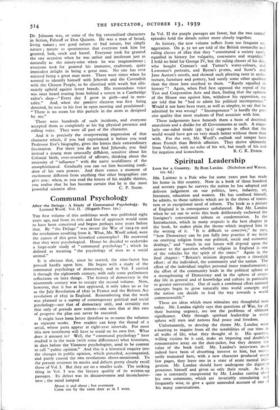Communal Psychology
After the Deluge : A Study of Communal Psychology. By Leonard Woolf. Vol. II. (Hogarth Press. r5s.)
THE first volume of this ambitious work was published eight years ago, and from its title and line of approach would seem to have been conceived and begun perhaps nine years before that. By "the Deluge" was meant the War of 1914-19 and the revolutions resulting from it. What, Mr. Woolf asked, were the causes of this great historical catastrophe? He answered that they were psychological. Hence he decided to uridertake a large-scale study of " communal psychology " ; which he defined as meaning " the psychology of man as a social animal."
It is obvious that, since he started, the time-factor has pressed hardly upon him. He began with a study of the communal psychology of democracy, and in Vol. I carried it through the eighteenth century, with only some preliminary reflections on later things. The history of democracy in the nineteenth century was to occupy the second volume. Now, however, that it has at last appeared, it only takes us as far as the July Revolution of 1830 in France and the Reform Act revolution of 1832 in England. Remembering that the work was planned as a survey of contemporary political and social psychology—not that of democracy only, and certainly not that only of periods now remote—one sees that at this rate of progress the plan can never be executed.
It might have been better therefore to re-name the volumes as separate works. Few readers can keep the thread of a serial, whose parts appear at eight-year intervals. For most this new instalment will have to stand on its own feet. What does it amount to? Well, the " communal psychology " here studied is in the main (with some differences) what historians, in days before the Viennese psychologists, used to be content to call " public opinion." And this is a historical enquiry into the changes in public opinion, which preceded, accompanied, and partly caused the two revolutions above-mentioned. To the present reviewer its merits and defects pretty closely recall those of Vol. I. But they are on a smaller scale. The striking thing in Vol. I was the literary quality of its written-up passages. Its defect was its discursiveness and inconclusive- ness ; the mind jumped
About it and about ; but evermore Came out by the same door as in I went. In Vol. II the purple passages are fewer, but the two centra. episodes hold the details rather more closely together.
As history, the new volume suffers from too frequent ex- aggeration. On p. 51 we are told of the British monarchy and ruling classes of azo that they "constituted a society rarely equalled in history for vulgarity, coarseness and stupidity." I hold no brief for George IV, but the ruling classes of his day, who bought Cotman's and Turner's water-colours, and Lawrence's portraits, and Byron's poems, and Scott's and Jane Austen's novels, and showed such pleasing taste in archi- tecture, furniture and pottery, had surely some other qualities than the three here ascribed to them. " Rarely equalled in history "! Again, when Peel first opposed the repeal of the Test and Corporation Acts and then, finding that the opinion of the House was against him, withdrew his opposition, we are told that he " had to admit his political incompetence." Would it not have been truer, as well as simpler, to say that he admitted he was wrong? " Incompetence " is hardly the pre- cise quality that most students of Peel associate with him.
These judgements have beneath them a basis of doctrinal anarchism and a dislike for all Governments as such. A singu- larly one-sided tirade (pp. 74-5) suggests in effect that the world would have got on very much better without them than with. For the rest, Mr. Woolf's outlook and temper have chore French than British affinities. They derive ultimately from Voltaire, with no echo of his wit, but much of his zest










































 Previous page
Previous page